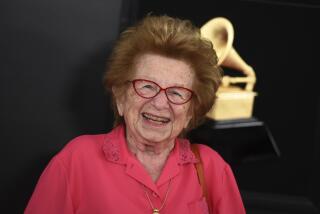Bruno Bettelheim, 86; Child Psychoanalyst
- Share via
Bruno Bettelheim, whose involvement with human emotion ranged from severely disturbed children at his famous school in Chicago to his fellow inmates at two Nazi concentration camps, died Tuesday.
Bettelheim was 86 and died at the Charter House nursing home in Silver Spring, Md., said Jacquelyn Sanders, director of the University of Chicago’s Sonia Shankman Orthogenic School for disturbed children. Bettelheim ran the school from 1944 to 1973, and was a professor of psychology and psychiatry at the university.
Dr. John Rogers, medical examiner of Montgomery County, Md., said Bettelheim committed suicide by “placing a plastic bag over his head. . . .”
“The patient had suffered a stroke a short time ago and was depressed.”
Born in Vienna to middle-class Jewish parents, he received his doctorate at the University of Vienna and studied under Sigmund Freud. The beloved and frequently quoted Bettelheim became a psychoanalyst who spent nearly 50 years exploring the mysteries of children’s minds.
Late in life, he wrote in “A Good Enough Parent” that most “expert advice” about children is “nonsense” and that despite whatever it is mothers and fathers do, “There are no perfect children.”
Trained in the incubator of psychoanalysis--Vienna--Bettelheim’s first international notice came after his own brushes with death in the Dachau and Buchenwald camps. He had been sent there by the Nazis in 1938 after the takeover of Austria, but was released a year later, partly through the intervention of Eleanor Roosevelt, who had heard of his early work with autistic children.
Out of that horror came his book, “Individual and Mass Behavior in Extreme Situations.”
Bettelheim came to the United States, where he and his late wife raised three children. He took over the Orthogenic (which means treatment of emotional illnesses in children) School in 1944 and brought it to world prominence.
The balding doctor with a trace of white hair just above his ears was known around the school as “Dr. Yes” for his permissive and loving attitude toward his charges, many of whom were chronic insomniacs or incurable runaways or inordinately disturbed children who had attempted suicide. Typically they ranged in age from 6 to 14.
But in the 1960s, when the radical student movement was heard throughout the land, he became known as “Dr. No,” the antithesis of Dr. Benjamin Spock, who sided with anti-Vietnam demonstrators.
After Bettelheim retired from the university, he moved to California for a while, where he added to the more than a dozen books he had already written. Out of that journey came “A Good Enough Parent,” the summation of what he described as “my lifelong effort to discover and test what is involved and required for successful child rearing,” and “The Uses of Enchantment,” a 1976 treatise on the importance of fairy tales to children’s emotional development.
His other works included “Dynamics of Prejudice,” published in 1950; “Love Is Not Enough,” 1950; “Truants from Life,” 1955; “The Informed Heart,” 1960, and “The Children of the Dream,” 1969.
Additionally, he wrote of social problems and racial prejudice, warning in “The Victim’s Image of the Anti-Semite” that “if we are to fight anti-Semitism effectively, the struggle must be based on the realities of human character and behavior, rather than on fictitious group stereotypes.”
Said school spokeswoman Sanders: “To me his most significant work was at the Orthogenic School, where he created a kind of environment for kids, for very complete failures. And he created an environment that was informed and could therefore influence the growth of these children who could become healthy humans who could make contributions to society rather than be a burden to society.”
More to Read
Sign up for Essential California
The most important California stories and recommendations in your inbox every morning.
You may occasionally receive promotional content from the Los Angeles Times.












